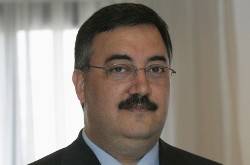A prominent Lebanese security official is among the dead in a car bombing in the capital Beirut that has killed at least eight people and wounded up to 80 others.
Wissam al-Hassan, head of the Information Branch of the Internal Security Forces (ISF), was the brain behind uncovering a recent bomb plot that led to the arrest of Michel Samaha, a Lebanese politician close to Syrian President Bashar al-Assad, who has been accused of trying to help smuggle explosives into Lebanon.
The ISF was also deeply involved in seeking the arrest of those responsible for a host of attacks and assassinations between 2005 and 2008, starting with the murder of Rafiq Hariri.
Friday's rush-hour car bombing has raised fears of renewed sectarian violence in a country still scarred from a long civil war. Al-Hassan was seen as close to Saad Hariri, leader of the March 14 alliance and a son of the former prime minister.
"The exact details of how this explosion killed Wissam al-Hassan are still unclear," Al Jazeera's Rula Amin, reporting from Beirut, said.
“Wissam al-Hassan is a very prominent figure in Lebanon. He played a key role in pursuing the killers of Rafiq al-Hariri, and one of his most recent achievements is the capturing and arrest of Michel Samaha.
"He is a very controversial figure for the March 8 alliance. He was a key figure in supporting the armed opposition in Syria, and the March 14 alliance is going to take this explosion much more seriously.
"This killing will stir a lot of tensions."
Heightened tension
The explosion has occurred at a time of heightened tension between Lebanese factions on opposite sides of the conflict in neighbouring Syria.
Ambulances rushed to the scene of Friday's blast in the Ashrafiyeh district, a mostly Christian neighbourhood, as smoke rose from the area.
Several cars were set on fire by the explosion and the front of a multistorey building was badly damaged.
Residents ran about in panic looking for relatives while others helped carry the wounded to ambulances.
Security forces were deployed in large numbers in the area.
The explosion struck a street where the office of the anti-Damascus Christian Phalange Party is located near Sassine Square.
Phalange leader Sami al-Gemayel, a staunch opponent of Assad and a member of Lebanon's parliament, condemned the attack.
"Let the state protect the citizens. We will not accept any procrastination in this matter, we cannot continue like that. We have been warning for a year. Enough," said Gemayel, whose brother was assassinated in November 2006.
Our correspondent said that already there were fears that the bombing meant the Syrian crisis had spilled over into Lebanon.
Lakhdar Brahimi, the UN-Arab envoy peace to Syria "warned two days ago that you cannot expect the Syrian crisis to remain within Syrian borders", she said.
The war in neighbouring Syria has pitted mostly Sunni fighters against President Assad, who is from the Alawite sect.
Too soon to tell
Ziad Baroud, a former Lebanese interior minister, told Al Jazeera that it is too soon to tell who is behind the deadly car bombing.
"High-ranking officials have not said anything so far, and therefore neither can I," he said.
"We have no indication whatsoever [of who is behind this]. We know this is a strong and sad message, and we know this could destabilise the whole country.
"People are reacting with fear, and they don't know what tomorrow may bring. But again, we cannot speculate in such a delicate situation."
Omar Nashabe, head of the justice and legal affairs department in Al Akhbar newspaper, told Al Jazeera: "This is the definition of a terrorist act, it was a large explosion in a civilian area, those killed were innocent civilians. These are the prerequisites of a terrorist act."
Regarding who may be behind the bombing, he said: "There are many suspicions, but we will wait for the investigation to be complete."
Michel Pharaon, a Lebanese politician with the March 14 alliance, told Al Jazeera that the coalition may have been a target of the explosion.
"This is a threat, a message, but it is too soon to discuss the details," he said.
"We have had lately some assassination attempts, which has reminded us of the period between 2005 and 2007, and this terrorist act is also a reminder of what used to happen in Ashrafiyeh during these years.
"Today some parties are trying to use violence again in Lebanon."
Resident's account
Nadim Badran, a resident of Ashrafiyeh, told Al Jazeera his entire building shook when the explosion occurred.
"I quickly made my way to the scene of the blast, and I saw glass on the street, people running, people screaming," he said.
"This is the first time since i've been living here for the last 20 years that I have felt like a sitting target. This is a message to all of us, that we are all targets. It could happen to any of us."
Regarding the possible consequences, Badran said: "As Lebanese we have absolutely no faith, no trust, no belief that anyone who did this can be found and brought to justice."
Balconies were torn off by the force of the blast, windows shattered and cars crushed by falling masonry.
"We heard a powerful explosion. The earth shook under our feet," said Roland, 19, among a large crowd of army, rescue workers and onlookers.
The most prominent car bombing since Lebanon's 1975-1990 civil war took place on February 14, 2005, when a massive blast killed Rafiq al-Hariri and 22 other people as his motorcade drove along the Beirut waterfront.
PHOTO CAPTION
Wissam al Hassan, one of Lebanon's top security officers, who was killed in the explosion.
Al-Jazeera


 Home
Home Discover Islam
Discover Islam Quran Recitations
Quran Recitations Lectures
Lectures
 Fatwa
Fatwa Articles
Articles Fiqh
Fiqh E-Books
E-Books Boys & Girls
Boys & Girls  Hajj Rulings
Hajj Rulings Hajj Fatwas
Hajj Fatwas














